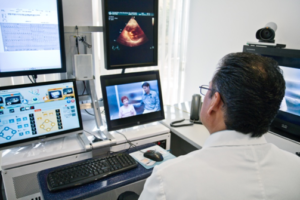The rapid spread of the coronavirus (now known as COVID-19) has sparked a global alarm. The World Health Organization (WHO) has declared a state of public health emergency of international concern (PHEIC), as many countries are grappling with a rise in the number of confirmed cases. As of March 5th 2020, data from WHO have shown that more than 95,499 confirmed cases have been identified in 84 countries/territories with more than > 99% of the cases emerging from China1. In the United States, the Centers for Disease Control and Prevention (CDC) have increased the risk from Coronavirus spread to level 3 and advised against non-essential travels to China, Iran, Italy, and South Korea. “It is not so much a questions of if this will happen anymore, but rather more a question of exactly when this will happen and how many people in this country will have severe illness” said Dr. Nancy Messonier, director of the National Center for Immunization and Respiratory Disease at the Center for Disease Control and Prevention in the United States.
What is coronavirus?
Coronavirus (CoV) are a large family of viruses that causes illness ranging from the common cold to more severe diseases such as the Middle East Respiratory Syndrome (MERS-CoV) and Severe Acute Respiratory Syndrome (SARS-Cov). A novel coronavirus (nCov) is a new strain that has not been previously identified in humans. Coronavirus are zoonotic, meaning they can transmit between animals (such as bats, cats, camel, and cattle) and human.
What is the clinical profile of COVID-19 infection?
Coronavirus infection is spread from human-to-human via droplets or direct contact. The infection is estimated to have a mean incubation period of 6.4 days (0-27 days), and a basic reproduction number of 2.24-3.58. Fever was the most common clinical feature followed by cough, shortness of breath, body ache, headache, and sore throat. There have been reports of gastrointestinal symptoms (nausea, vomiting, or diarrhea) before respiratory symptoms occur, but this is largely a respiratory virus. Those who have the virus may not have obvious symptoms (asymptomatic), or may have symptoms ranging from mild to severe. In some cases, the virus could be life-threatening. Older adults are less likely to present with fever, thus close assessment of these group of patients with other symptoms such as cough and shortness of breath is critical.
What are the cardiac Implications of COVID-19?
Early reports show that 50% of hospitalized COVID-19 patients had an underlying chronic medical illness, 80% of which are cardiovascular and cerebrovascular disease. The American College of Cardiology (ACC) issued a bulletin recently to warn patients with heart disease about their potential risk for complications if they contracted the disease. This does not mean that patients with cardiovascular disease or with cerebrovascular disease are at increased risk of getting coronavirus. However, they should practice additional precautions, since they are at great risk for complications. Nearly 20% of people developed Acute Respiratory Distress Syndrome (ARDS) according to a case report of Wuhan hospitalized patients. In addition, 7.2% of patients developed acute cardiac injury, 8.7% shock, 3.6% developed acute kidney injury, and 16.7% developed arrhythmia. Several unpublished first-hand reports suggest at least some patients develop myocarditis. Therefore, it would be reasonable to triage patients with COVID-19 infection according to the presence of underlying cardiovascular disease, renal disease, respiratory and other chronic diseases for prioritized treatment.
Several experts suggested rigorous use of guideline-directed plaque stabilizers (such as ACE-inhibitors, Statin, Beta-blockers, Aspirin) as it could protect cardiovascular patients during wide-spread outbreak of the virus. Furthermore, it is important for patients with cardiovascular disease to remain up to date with vaccination, including pneumococcal vaccine given the risk of secondary bacterial infection. It would be also crucial to receive the influenza vaccine to prevent any other sources of fever which could be initially confused with coronavirus infection.
The outbreak of COVID-19 has become a global clinical and public health threat. Knowledge about this novel virus remains limited. What we can do now is aggressively implement infection control measures to prevent the spread of COVID-19 via human- to- human transmission.
References:
- World Health Organization declares Global Emergency: A review of the 2019 Novel Coronavirus (COVID-19), International Journal of Surgery, (March 2020)
- Travel Health Notices: https://wwwnc.cdc.gov/travel/notices#travel-notice-definitions
- Chen H, Zhou M, Dong X, et al. Epidemiological and Clinical Characteristics of 99 cases of 2019 novel coronavirus pneumonia in Wuhan, China: a descriptive study. Lancet 2020; published online January 29. https://www.thelancet.com/action/showPdf?pii=S0140-6736%2820%2930211-7
- Wang D, Hu B, Hu C, et al.Clinical Characteristics of 138 Hospitalized Patients with2019 Novel Coronavirus- Infected Pneumonia in Wuhan, China. JAMA. Published online February 07, 2020. doi:10.1001/jama.2020.1585
- Cardiac Implications of Novel Coronavirus (COVID-19): https://www.acc.org/~/media/665AFA1E710B4B3293138D14BE8D1213.pdf
“The views, opinions and positions expressed within this blog are those of the author(s) alone and do not represent those of the American Heart Association. The accuracy, completeness and validity of any statements made within this article are not guaranteed. We accept no liability for any errors, omissions or representations. The copyright of this content belongs to the author and any liability with regards to infringement of intellectual property rights remains with them. The Early Career Voice blog is not intended to provide medical advice or treatment. Only your healthcare provider can provide that. The American Heart Association recommends that you consult your healthcare provider regarding your personal health matters. If you think you are having a heart attack, stroke or another emergency, please call 911 immediately.”
 [4]
[4]